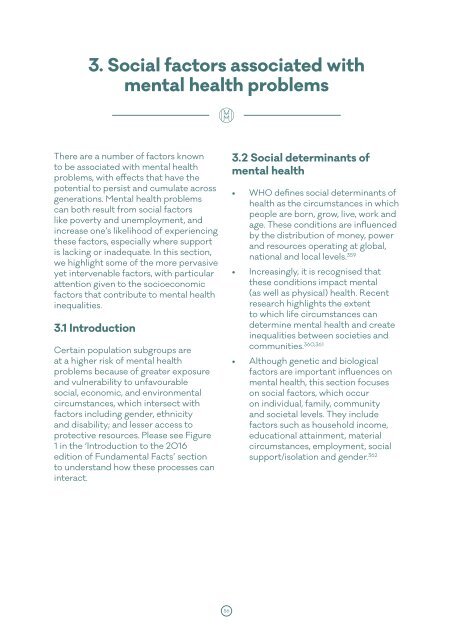FUNDAMENTAL FACTS ABOUT MENTAL HEALTH 2016
fundamental-facts-about-mental-health-2016
fundamental-facts-about-mental-health-2016
Create successful ePaper yourself
Turn your PDF publications into a flip-book with our unique Google optimized e-Paper software.
3. Social factors associated with<br />
mental health problems<br />
There are a number of factors known<br />
to be associated with mental health<br />
problems, with effects that have the<br />
potential to persist and cumulate across<br />
generations. Mental health problems<br />
can both result from social factors<br />
like poverty and unemployment, and<br />
increase one’s likelihood of experiencing<br />
these factors, especially where support<br />
is lacking or inadequate. In this section,<br />
we highlight some of the more pervasive<br />
yet intervenable factors, with particular<br />
attention given to the socioeconomic<br />
factors that contribute to mental health<br />
inequalities.<br />
3.1 Introduction<br />
Certain population subgroups are<br />
at a higher risk of mental health<br />
problems because of greater exposure<br />
and vulnerability to unfavourable<br />
social, economic, and environmental<br />
circumstances, which intersect with<br />
factors including gender, ethnicity<br />
and disability; and lesser access to<br />
protective resources. Please see Figure<br />
1 in the ‘Introduction to the <strong>2016</strong><br />
edition of Fundamental Facts’ section<br />
to understand how these processes can<br />
interact.<br />
3.2 Social determinants of<br />
mental health<br />
• WHO defines social determinants of<br />
health as the circumstances in which<br />
people are born, grow, live, work and<br />
age. These conditions are influenced<br />
by the distribution of money, power<br />
and resources operating at global,<br />
national and local levels. 359<br />
• Increasingly, it is recognised that<br />
these conditions impact mental<br />
(as well as physical) health. Recent<br />
research highlights the extent<br />
to which life circumstances can<br />
determine mental health and create<br />
inequalities between societies and<br />
communities. 360,361<br />
• Although genetic and biological<br />
factors are important influences on<br />
mental health, this section focuses<br />
on social factors, which occur<br />
on individual, family, community<br />
and societal levels. They include<br />
factors such as household income,<br />
educational attainment, material<br />
circumstances, employment, social<br />
support/isolation and gender. 362<br />
56


